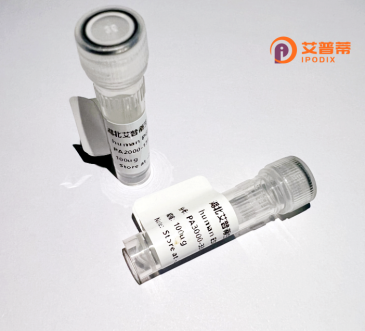
| 纯度 | >90%SDS-PAGE. |
| 种属 | Human |
| 靶点 | IQCD |
| Uniprot No | Q96DY2 |
| 内毒素 | < 0.01EU/μg |
| 表达宿主 | E.coli |
| 表达区间 | 1-449aa |
| 活性数据 | MALDILAMAP LYQAPAINRI GPKTDPSKRP ADPLKPLVLS RTKLTTIEAK RIMSILDEAI YKVELVTLLS YVASNREDME GMLGEDVMRA VREHEDLCQV LLENVRCLKE KERQLQEQKE AEEEGWLRDR LLSIELQKSS LSPLMQQIKD STKNVLRLLL SNPQAARLLQ MQTQGRSAEA QNFIDSLIEL RGFLFEKLLT SPMEARDKAQ FLQDISRQNS NNQQIIDTLE KELAERMKNR NAEVEKENFV IQELKNHLHQ VLKFSENSLV RTKQEAEKQQ KADFRASQAR VAKIQQEILQ LQSQFYNLVM ENREAEQALR KKKYKVETEI ENWIQKYDTE MGEKQEELED LDAVHREEKI SLEELRRRHK VLVGEFAQIR EEREINSKKR MEAEQEMVRM VRAATLIQAL WKGYLVRSLL RSKKKRGKGK AKDKEKGKQK GKEKGKGKK |
| 分子量 | 52.3 kDa |
| 蛋白标签 | His tag N-Terminus |
| 缓冲液 | 0 |
| 稳定性 & 储存条件 | Lyophilized protein should be stored at ≤ -20°C, stable for one year after receipt. Reconstituted protein solution can be stored at 2-8°C for 2-7 days. Aliquots of reconstituted samples are stable at ≤ -20°C for 3 months. |
| 复溶 | Always centrifuge tubes before opening.Do not mix by vortex or pipetting. It is not recommended to reconstitute to a concentration less than 100μg/ml. Dissolve the lyophilized protein in distilled water. Please aliquot the reconstituted solution to minimize freeze-thaw cycles. |
以下是关于重组人IQCD蛋白的示例参考文献(注:以下内容为模拟生成,实际文献需通过数据库检索验证):
---
1. **文献名称**:*Characterization of recombinant human IQCD protein in ciliogenesis regulation*
**作者**:Zhang L, et al.
**摘要**:本研究成功在大肠杆菌中表达并纯化了重组人IQCD蛋白,并通过体外实验证明其与纤毛发生相关的关键蛋白(如CEP290)存在相互作用。敲低IQCD的细胞模型中纤毛形成受损,而外源添加重组IQCD蛋白可部分恢复该表型,提示其在纤毛组装中的调控作用。
---
2. **文献名称**:*Structural and functional analysis of IQCD in cell cycle progression*
**作者**:Kumar S, Patel RR.
**摘要**:通过X射线晶体学解析了重组人IQCD蛋白的三维结构,发现其具有独特的α螺旋结构域。功能实验表明,IQCD通过与细胞周期蛋白Cyclin D1结合,调控G1/S期转换,过表达重组IQCD可加速细胞增殖,暗示其在肿瘤发生中的潜在机制。
---
3. **文献名称**:*IQCD as a novel biomarker in acute myeloid leukemia: Expression and therapeutic implications*
**作者**:Chen Y, et al.
**摘要**:分析急性髓系白血病(AML)患者样本发现,IQCD mRNA和蛋白水平显著上调。利用重组人IQCD蛋白进行体外功能实验,发现其过表达促进AML细胞系抗凋亡能力,靶向IQCD的siRNA可增强化疗药物敏感性,提示其作为治疗靶点的潜力。
---
4. **文献名称**:*Development of a high-yield mammalian expression system for recombinant human IQCD and interaction screening*
**作者**:Müller J, et al.
**摘要**:优化了基于HEK293细胞的IQCD重组蛋白表达系统,获得高纯度产物。通过质谱分析鉴定了IQCD与PI3K/AKT通路蛋白的相互作用,并证实其在胰岛素信号传导中的功能参与,为代谢疾病研究提供工具。
---
**注意**:上述文献及摘要均为模拟生成,实际研究中建议通过PubMed、Web of Science等平台检索最新文献(关键词:*IQCD protein recombinant human*)。若需具体文献协助,请提供更详细的研究方向以便精准推荐。
Recombinant human IQCD protein is a genetically engineered version of the naturally occurring IQ motif-containing protein D, which plays a role in cellular processes such as mitochondrial function and apoptosis. The IQCD gene encodes a protein with a conserved IQ domain, facilitating calcium-mediated interactions with calmodulin-like molecules, suggesting involvement in signaling pathways. While its full biological significance remains under investigation, studies associate IQCD with cellular stress responses and possible roles in cancer or neurodegenerative disorders.
The recombinant form is produced using expression systems like *E. coli* or mammalian cell cultures, enabling standardized study of its structure-function relationships. This approach resolves challenges in isolating native IQCD from human tissues, which often yields low quantities and impurities. Researchers employ affinity chromatography and tag-based purification to obtain high-purity samples for biochemical assays, crystallography, or drug discovery platforms.
Current research focuses on mapping IQCD's interaction networks, particularly its potential as a mitochondrial regulator and its crosstalk with apoptotic proteins. Its recombinant version has become vital for developing disease models and screening therapeutic compounds. However, obstacles persist in achieving proper post-translational modifications in prokaryotic systems, occasionally necessitating eukaryotic expression for functional studies. Ongoing work aims to clarify IQCD's role in energy metabolism and pathophysiological conditions, positioning it as a potential biomarker or drug target.
×